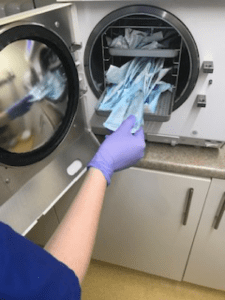LATEST UPDATE 01/07/2020
We are open for all dental emergencies and these are prioritised. We have been helping existing and NEW patients in pain since June 8th 2020.
In addition, we are now able to carry out an increased range of procedures. However, there is a new set of safety procedures designed to minimise the risk to your health as below:
- You will be asked to fill in a pre-attendance Covid risk assessment and check that you are not suffering with symptoms or is Covid positive or in contact with a Covid positive person.
- You will be asked to stay outside or in your car until we phone to ask you to come in
- We will take your temperature upon entry to the practice and must not be elevated. If it is elevated we will be unable to allow you into the clinic.
- You will need to use the hand sanitiser and if you have a mask please wear it.
- On entry to the surgery room we will check the your medical health status, ensure there is justification of treatment provided and evaluate the risk of not providing treatment.
- We will provide treatment wearing the appropriate level of PPE
In addition to following the UK Government and HSE advice we have installed an additional high power suction (dental vac station) to remove the aerosol. The aerosol is invisible to the naked eye and comprises tiny particles ( 5-40 micrometres). The particle are suspended in the air. AGP or aerosol generated procedures are used only when essential and we will wear FFP2 or FFP3 masks. Following this type of procedure we clean down the surgery, open the windows and leave the surgery unused (fallow period) for 60 minutes
What procedures can we do:
- Examinations
- Temporary dressings
- Treatment of abscesses
- Extractions if necessary
- Re- fitting of lost crowns and bridges
- Cementation of crowns
- Tightening up loose implant crowns and bridges
Additional investment made by us to protect you further from Covid-19 during dental treatment.
At the moment we can only offer limited dental services : emergencies and non-aerosol generating procedures. At the moment we cannot use the usual dental drill ( air-turbine) and our hygienist cannot use the sonic scaler. When we get permission to use the ‘air-turbine, we will need to use special masks (FFP2 or FFP3 masks are the masks which must be worn for AGP’s). This is the Dental Vac Station: we have purchased 2 of these ( amongst the first in the UK to receive these units). The dental vac station is a new high powered aerosol removing unit which we will be using: but not at the moment.


Update on corona virus: 19/3/2020
The health of our patients and dental team remain our top priority at all times. We carefully follow the latest guidance of the UK Government, the NHS and the General Dental Council as we get it.
When entering the practice please use the alcohol gel rub for your hands and again in our washroom facilities.
Increased risk group
These are a group of patients who are likely to be severely ill if they catch the virus: we do not believe being in this group makes you more likely to become infected with the virus.
Increased risk categories:
- 70 years or older
- long-term serious medical condition e.g. example, heart disease, lung disease, diabetes, cancer or high blood pressure
- pregnant
- have a weakened immune system (immuno-suppressed)
If you are in the increased risk group, you should only attend if you are in severe pain or have a dental abscess developing or present:
Symptoms of corona virus
Anyone showing symptoms including a new persistent cough or high temperature to contact us to reschedule their appointment. NHS advice on the corona virus is available at https://www.nhs.uk/conditions/coronavirus-covid-19/
Our strategies to keep you safe from corona virus
Here at Oral Implants Ltd and Dentist@ 29, we continue to work to, and beyond, the latest UK government and NHS recommendations and adopt ‘best practice’ principals. These are termed universal precautions. This means we treat every patient as if they were suffering with a highly contagious disease. So, every time we see another patient, the room is cleaned down and re-prepared to make it safe BEFORE the next patient enters.
One third of my PhD studies were based on cross infection control and reducing bacterial contamination: I received a grant from North West Regional Health Authority to fund my research on cross infection control as it was thought to be very important. The research was published internationally and then disseminated via the NHS electronic research database to all medical, surgical and dental specialties. I have always ensured our clinic focusses on cleanliness and delivering dentistry in an environment of the highest standards of cross infection control.
Hand disinfection on the reception desk
We have been offering hand disinfectants at our reception desk since June 2018, some 18 months ahead of the corona virus crisis. I felt it was critically important to reduce cross infection risks to the lowest possible. Door handles are wiped frequently with anti-viral and antibacterial agents.
Hand disinfection in the surgery
We change gloves for every patient and use hand disinfectants before and after every patient enters the surgery. All hard surfaces are sprayed or wiped down with anti-bacterial + anti-viral agents.
Clean air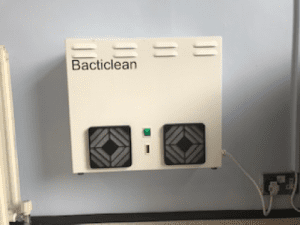


In the surgery we have an antibacterial ultra-violet air cleaner for operating: now it is switched on every day, all day.
Entering + leaving the toilets on our premises
Corona virus is transmitted via the oro-faecal route, so meticulous hand hygiene after using the toilet is hugely important. We ask all patients to clean their hands thoroughly after using the toilet here and provide professional antibacterial cleansing solutions as well as soap and water.
YOUR SAFETY IS ALWAYS OUR 1ST PRIORITY
Mr. Peter Young PhD BDS
Specialist in oral surgery
March 16/ 3/2020
Dedicated Sterilization Unit



Vacuum sterilization autoclave
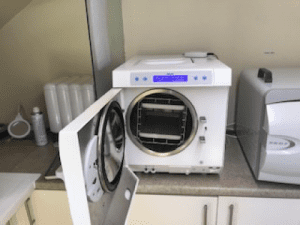


Washer disinfector machine for pre-sterilization cleaning
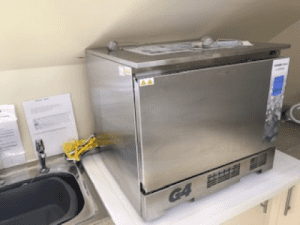


Decontamination nurse using an illuminated magnifying glass to check the washer disinfector has removed debris on instruments before being sterilized.
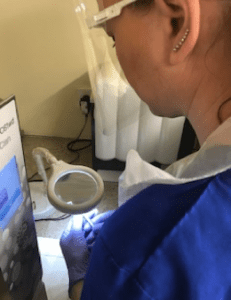


Special machine for cleaning out dental drills before sterilization
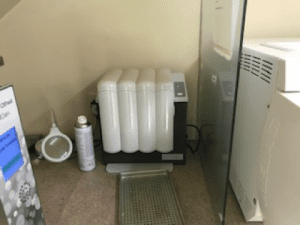


Sterilized instruments come out packaged and dried
